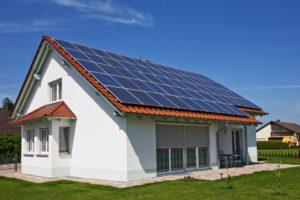As we seek sustainable solutions for our energy needs, harnessing the power of solar energy becomes increasingly appealing. While solar panels are commonly associated with electricity generation, they can also provide heat for various heating systems. This article will explore the feasibility and advantages of running a heating system with solar power. Discover how solar energy can revolutionize your home’s heating needs, from space heating to hot water production.
Contents
- 1 Key Takeaways
- 2 Solar Heating Systems: An Overview
- 3 Solar Space Heating: How Does It Work?
- 4 Solar Hot Water Systems for Heating
- 5 Solar-Powered Radiant Floor Heating
- 6 Solar Space Heating Options: Beyond Radiant Floors
- 7 Cost-Effectiveness and Energy Savings
- 8 Maximizing Solar Heat and Efficiency
- 9 Case Study: Implementing Solar Heating Solutions for a Residential Home
- 10 Expert Insights From Our Solar Panel Installers About Running a Heating System with Solar
- 11 Experience Solar Excellence with Us!
- 12 Conclusion
Key Takeaways
- Solar heating systems offer a viable and sustainable solution for running a heating system with solar power, utilizing solar thermal or solar air heating to generate heat for space heating and hot water production.
- Integrating solar energy with radiant floor heating, forced air systems, or baseboard heaters provides cost-effective and energy-efficient alternatives to traditional heating methods, reducing reliance on fossil fuels.
- By harnessing the sun’s power, homeowners can achieve long-term cost savings, energy efficiency, and environmental sustainability, making solar heating systems a compelling choice for greener and more sustainable homes.
Solar Heating Systems: An Overview
Solar heating systems encompass a range of technologies designed to harness solar energy for heat generation. Let’s look at the different types of solar heating systems and their functionalities.
Solar thermal systems are widely used for heating applications. These systems utilize solar collectors to capture the sun’s energy and transfer it to a fluid, typically water or a heat transfer fluid. Depending on the system’s configuration, the heated fluid is then used for space heating, hot water production, or both. Solar thermal systems can be further categorized into direct and indirect systems, each offering unique advantages and applications.
On the other hand, solar air heating systems focus on utilizing solar energy to heat air directly. Solar collectors capture the sun’s energy, which is used to warm the air. This heated air can be distributed throughout the space using fans or ductwork, providing efficient and cost-effective heating.
Solar Space Heating: How Does It Work?
Solar space heating systems utilize solar collectors to capture and convert solar energy into heat for space heating purposes. The process involves several key components working in harmony to provide a comfortable indoor environment.
Solar collectors, commonly mounted on rooftops or other suitable locations, capture sunlight and transfer the collected heat to a heat transfer fluid, usually a water-glycol mixture. Now heated by the sun’s energy, this fluid is circulated through pipes or tubing, transferring the thermal energy to the space that requires heating.
In radiant floor heating systems, the heated fluid circulates through a network of pipes installed beneath the floor. The warm floors then radiate heat upwards, providing even and efficient heating throughout the space. Radiant floor heating is known for its exceptional comfort, energy efficiency, and compatibility with solar heating systems.
Solar Hot Water Systems for Heating
Solar hot water systems offer an excellent opportunity to utilize solar energy for heating purposes, particularly for domestic hot water production. These systems capture solar energy through solar collectors, which heat a fluid, often water or a heat transfer fluid. The heated fluid is then stored in a well-insulated storage tank, ready for domestic hot water needs, or circulated through a radiant floor heating system.
Solar hot water systems can significantly reduce or eliminate the need for traditional water heating methods such as natural gas or electric water heaters. By harnessing the sun’s power, homeowners can enjoy cost-effective and environmentally friendly hot water production while reducing their carbon footprint.

Solar-Powered Radiant Floor Heating
Radiant floor heating systems offer exceptional comfort and energy efficiency when combined with solar energy. This popular heating method involves installing pipes or electric heating elements beneath the floor. The solar heating system provides thermal energy to warm the fluid or electric elements, transferring the heat to the floor.
Radiant floor heating ensures an even distribution of heat throughout the space, creating a cozy and comfortable environment. By integrating solar power into radiant floor heating, homeowners can enjoy the benefits of renewable energy while experiencing this heating method’s exceptional comfort and efficiency.
Solar Space Heating Options: Beyond Radiant Floors
While radiant floor heating is popular, alternative options exist for utilizing solar energy in space heating applications. Solar power can be integrated with forced air systems, where solar heat warms the air directly, which is then distributed throughout the space using ductwork and fans. This method allows for efficient heating while leveraging the power of solar energy. Additionally, solar energy can be harnessed for baseboard heating systems, where the solar heat is used to warm the air, which then rises and circulates within the room. Integrating solar panels with electric baseboard heaters provides a cost-effective and sustainable heating solution.
Cost-Effectiveness and Energy Savings
One of the significant advantages of running a heating system with solar power is the potential for cost savings and energy efficiency. Solar heating systems reduce or eliminate the need for traditional heating methods that rely on fossil fuels. By utilizing renewable solar energy, homeowners can significantly decrease their heating costs while reducing their carbon footprint.
The cost-effectiveness of solar heating systems extends beyond the savings on heating bills. Many regions offer incentives, tax credits, or rebates for installing solar heating systems, making the initial investment more affordable. These incentives, combined with long-term energy savings, contribute to the overall financial viability of solar-powered heating.
Furthermore, solar heating systems provide a hedge against rising energy costs. As traditional energy prices continue to increase, homeowners with solar heating systems enjoy stable and predictable heating costs. The abundance and availability of sunlight make solar energy a reliable and cost-effective alternative for long-term heating needs.

Maximizing Solar Heat and Efficiency
Several strategies can be implemented to optimize solar heat utilization and enhance the efficiency of your solar heating system.
Proper system sizing and orientation are crucial in maximizing solar heat collection. Optimally positioning solar collectors to capture the maximum sunlight exposure throughout the day ensures optimal heat generation. Additionally, the correct sizing of the solar heating system based on the heating demands of the space contributes to efficient energy utilization.
Advanced controls and monitoring systems can further enhance the efficiency of solar heating systems. These systems allow for precise temperature control, timing, and heat distribution, ensuring optimal comfort while minimizing energy waste. Real-time monitoring enables homeowners to track and assess the system’s performance, promptly identifying potential issues.
Regular maintenance and inspections are essential to ensure the longevity and efficiency of solar heating systems. This includes cleaning the solar collectors to remove any dirt or debris hindering heat absorption. Additionally, checking for leaks, proper fluid circulation, and system integrity is crucial for optimal performance.
Case Study: Implementing Solar Heating Solutions for a Residential Home
Background
At Solar Panels Network USA, we were approached by a homeowner interested in transitioning to a solar-powered heating system. The homeowner aimed to reduce energy costs and reliance on fossil fuels while maintaining a comfortable indoor environment throughout the year.
Project Overview
Our objective was to design and install a comprehensive solar heating system that would meet the homeowner’s space heating and hot water needs. This involved evaluating different solar heating technologies, ensuring optimal system integration, and achieving significant energy savings.
Implementation
Assessing Energy Needs and Site Evaluation
We began by conducting a thorough assessment of the homeowner’s energy needs. Analyzing historical energy consumption data provided insights into their heating requirements. Additionally, we evaluated the site’s suitability, including roof orientation and available space for solar collectors.
Selecting the Solar Heating System
Based on the homeowner’s preferences and energy requirements, we recommended a hybrid solar thermal system. This system combined solar collectors for both space heating and hot water production. The system’s versatility allowed us to address multiple heating needs efficiently.
Installation of Solar Collectors and Integration
We installed high-efficiency solar collectors on the south-facing roof to maximize sun exposure. These collectors were designed to capture solar energy and transfer it to a heat transfer fluid. The heated fluid was then circulated through a radiant floor heating system and a domestic hot water storage tank.
Integrating Radiant Floor Heating
For space heating, we implemented a radiant floor heating system. This involved installing a network of pipes beneath the flooring, through which the heated fluid circulated. Radiant floor heating ensured an even and comfortable distribution of heat throughout the living spaces.
Solar Hot Water System
In addition to space heating, the system included a solar hot water component. The heated fluid from the solar collectors was used to provide hot water for domestic use. This dual-function system significantly reduced the homeowner’s reliance on conventional water heaters.
Advanced Controls and Monitoring
To enhance the system’s efficiency, we integrated advanced controls and monitoring. These controls allowed precise temperature regulation, optimizing energy usage based on real-time conditions. The monitoring system provided valuable data on energy production and consumption, ensuring optimal performance.
Results
The solar heating system exceeded expectations, providing consistent and efficient heating for both space and water needs. The homeowner reported a substantial reduction in energy bills and expressed satisfaction with the system’s performance. By harnessing solar energy, they achieved significant cost savings and reduced their carbon footprint.
Summary
This case study highlights the successful implementation of a solar heating system for a residential home. By leveraging solar thermal technology, we provided the homeowner with a sustainable and cost-effective solution for their heating needs. The project demonstrates the feasibility and advantages of integrating solar power into residential heating systems, contributing to long-term energy savings and environmental sustainability.
Expert Insights From Our Solar Panel Installers About Running a Heating System with Solar
Integrating solar power into your heating system is a fantastic way to reduce energy costs and environmental impact. Solar thermal systems, in particular, are highly effective for both space heating and hot water production.
Chief Solar Technician
Solar-powered radiant floor heating provides an even and efficient heat distribution. By leveraging solar energy, you can achieve remarkable energy savings and unparalleled comfort in your home.
Lead Solar Installer
One of the biggest advantages of solar heating systems is their ability to stabilize heating costs. With the right system, homeowners can enjoy consistent and predictable energy expenses despite fluctuating fossil fuel prices.
Solar Energy Consultant
Experience Solar Excellence with Us!
Trust in Solar Panels Network USA, where our seasoned experts deliver top-quality solar solutions for homes and businesses nationwide. With a legacy of countless successful installations and a commitment to sustainable energy, we’re your reliable partner in the solar journey. Ready for a brighter, eco-friendly future? Call us now at (855) 427-0058 and harness the power of the sun!
Conclusion
Harnessing the power of solar energy for heating purposes offers numerous benefits, from cost savings to environmental sustainability. Using solar thermal or solar air heating systems, you can heat your home and produce hot water using clean and renewable energy. Whether you opt for radiant floor heating, forced air systems, or other solar-powered options, you can reduce your dependence on fossil fuels and contribute to a greener future.
Investing in a solar heating system may require an upfront cost, but the long-term savings, energy efficiency, and reduced environmental impact make it a compelling choice. Explore the possibilities of using solar energy to heat your home and enjoy the comfort and sustainability it brings. Embrace the sun’s power and experience the benefits of running a solar-powered heating system.
Utilizing solar panels and solar thermal energy can transform how you heat your home, making it more efficient, cost-effective, and environmentally friendly. Say goodbye to high heating costs and reliance on fossil fuels, and embrace the clean and renewable energy of the sun. Switch to solar heating systems and enjoy a warm, comfortable home while reducing your carbon footprint. Start your journey towards sustainable heating today!
About the Author
Solar Panels Network USA stands at the forefront of solar energy solutions, driven by a team of seasoned solar engineers and energy consultants. With over decades of experience in delivering high-quality solar installations and maintenance, we are committed to promoting sustainable energy through customer-centric, tailored solutions. Our articles reflect this commitment, crafted collaboratively by experts to provide accurate, up-to-date insights into solar technology, ensuring our readers are well-informed and empowered in their solar energy decisions.

